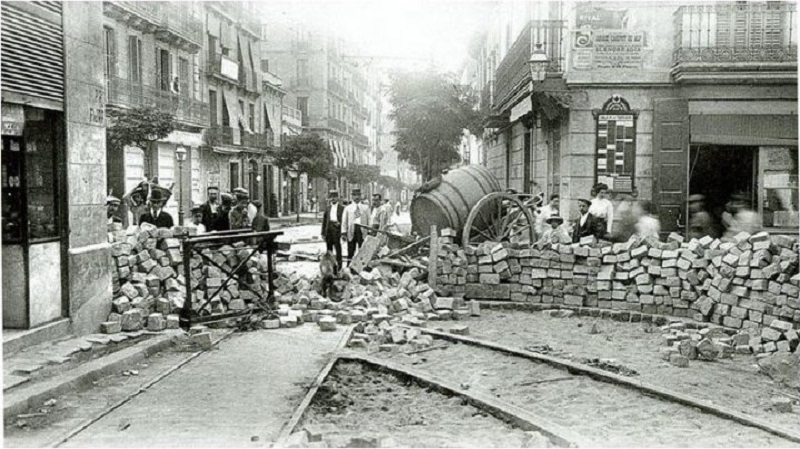On the 7th of january in 1919, the "Semana Trágica" began in Argentina when police attacked striking metalworkers in Buenos Aires, killing five, after workers set the police chief's car on fire. The city was quickly placed under martial law.
The "Semana Trágica" (Tragic Week in English, not to be confused with the Spanish Tragic Week) was the violent supression of a general workers' uprising, beginning with the attack on January 7th. In addition to the actions of the police and military, right-wing vigilantes launched pogroms against the city's Jews, many of whom were not involved, in order to suppress the rebellion.
The conflict began as a strike at the Vasena metal works, an English Argentine-owned plant in the suburbs of Buenos Aires. On January 7th, workers overturned and set fire to the car of the police chief Elpidio González. Militant workers also shot and killed the commander of the Army detachment protecting González. Following this, police attacked, killing five workers and wounding twenty more.
On the same day, maritime workers of the port of Buenos Aires voted in favor of a general strike for better hours and wages. After the police attack at Vasena, a waterfront strike began: all ship movements, and all loading and unloading, came to a halt.
Rioting soon spread throughout Buenos Aires, and workers battled with both state and right-wing paramilitary forces. Police utilized members of the far-right Argentine "Patriotic League", who targeted the city's working class Russian Jewish population, which they associated with the rebellion, beating and murdering many uninvolved civilians.
On the 11th, the city was placed under martial law, and the military restored control over the city over the next several days. Estimates of the death toll range from between 141 to over 700. The United States embassy reported that 1,500 people were killed in total, "mostly Russians and generally Jews"
La Semana Trágica - el historiador

Megathreads and spaces to hang out:
- ❤️ Come listen to music and Watch movies with your fellow Hexbears nerd, in Cy.tube
- 💖 Come talk in the New Weekly Queer thread
- 💛 Read and talk about a current topics in the News Megathread
- ⭐️ September Movie Nominations ⭐️
reminders:
- 💚 You nerds can join specific comms to see posts about all sorts of topics
- 💙 Hexbear’s algorithm prioritizes comments over upbears
- 💜 Sorting by new you nerd
- 🌈 If you ever want to make your own megathread, you can reserve a spot here nerd
- 🐶 Join the unofficial Hexbear-adjacent Mastodon instance toots.matapacos.dog
Links To Resources (Aid and Theory):
Aid:
Theory:



I wonder if koreans also make videos titled like "eating the wettest gas station hot dog in texas"
Foreigners always do funny things like that in Asia. It is amusing to see them filming and getting excited over things that we consider mundane. Like watching a child discover the world for the first time.
I love watching people get excited over stuff that's normal in other cultures! One of the mottoes that Anthropologists live by is "Make the strange familiar. Make the familiar strange". We want to break down people's belief in the normalcy of their own culture, make them examine what they do and why. And then at the same time break down the illusion of extreme difference with other cultures, help them realize that some (definitely not all!) practices in foreign cultures are much more familiar and cozy than they seem at first sight.
I hope so. Adventures in fast food are a really fun way to learn about other cultures. I tried Korea dried squid once. I did not expect it to be sweet. I was expecting some kind of savory treat. It didn't suit my palate, the combination of sweet and an unfamiliar texture was too much for me to acclimate too in one serving, but I'm glad I tried it and I wouldn't have even known it existed but for watching Korean movies (notably The Host, which is about failchildren stepping up to save the day after American causes problems. Great movie strong reccomend, though it is a horror movie and can be quite heavy and sad at moments).
Dried squid is like a drinking food, you'll have a beer, maybe some nuts and some shredded salty/sweet fish or seafood. I think it's also sweet because of the preservatives perhaps, like salt for jerky. It kinda hits the spot.
Absolutely nothing wrong with this.
You can order buldak on Amazon what is this person doing
Edit: that looks good as hell tho imma go make some
Is that a mitch McConnell mukbang